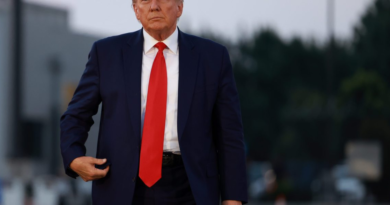Bill Clinton feels ‘terrible’ about the role he played in denuclearizing Ukraine
Russia’s decision to invade Ukraine last year bookended centuries of grievances and territorial disputes, but a critical decision to strip Ukraine of weapons that could have deterred Russian advances was made only a few decades ago, and former U.S. President Bill Clinton played a pivotal role.
“Ukraine is a very important country, and I feel a personal stake because I got them to agree to give up their nuclear weapons, and none of them believed that Russia would have pulled this stunt if Ukraine still had their weapons,” Clinton said in an interview with Irish broadcaster RTE that aired Tuesday.
In January 1994, one year into his first term as president, Clinton helped negotiate an agreement between Russian President Boris Yeltsin and Ukrainian President Leonid Kravchuk to transfer all nuclear warheads in Ukraine to Russia. The agreement also set the stage for Ukraine’s later inclusion in the Treaty on the Non-Proliferation of Nuclear Weapons (NPT) as a nonnuclear-weapon state, something Kravchuk then wanted to see happen “in the shortest possible time.” Ukraine would join the NPT later that year, along with fellow former Soviet Republics Belarus and Kazakhstan.
As part of the agreement, Ukraine not only agreed not to develop nuclear weapons in the future, but it also relinquished the atomic remnants of the bygone Soviet era back to Russia for dismantlement. At the time, this inherited nuclear arsenal included 176 intercontinental ballistic missile launchers armed with 1,240 nuclear warheads, 700 nuclear cruise missiles arming 44 strategic bombers, and almost 3,000 tactical nuclear weapons, according to think tank the Wilson Center. In total, Ukraine surrendered around 5,000 strategic and tactical nuclear weapons, which for a brief moment had made it the third-largest nuclear power in the world.
When Ukraine willingly returned its nuclear weapons to Russia, it did so under the understanding that the smaller country would never need them to defend itself in future. The U.S., Russia, and the U.K. signed the 1994 Budapest Memorandum on Security Assurances for former Soviet Republics, which pledged respect for sovereignty and existing borders of countries including Ukraine. In his interview with RTE this week, Clinton said that Yeltsin supported the accords, but his eventual successor Vladimir Putin had other ideas in mind.
“President Putin did not support the agreement President Yeltsin made never to interfere with Ukraine’s territorial boundaries,” Clinton said. “President Putin broke it and first took Crimea, and I feel terrible about it.”
The U.S. and Russia issued a joint statement reaffirming their commitment to the security assurances in the Budapest Memorandum in 2009 when the first START treaty to limit the size of nuclear arsenals expired. Putin was Russia’s prime minister at the time under President Dmitry Medvedev, after having already served two terms as president.
But his commitment to respecting Ukraine’s borders did not last long. The invasion and annexation of Crimea in 2014 violated the Budapest Memorandum as well as several other international agreements, and sparked some political debate on the merits of Ukraine’s denuclearization strategy.
“We gave up nuclear weapons because of this agreement,” Pavlo Rizanenko, a Ukrainian politician who at the time served in Ukraine’s parliament, told USA Today in 2014. “Now there’s a strong sentiment in Ukraine that we made a big mistake.” He added that Ukraine might have to arm itself with nuclear weapons once again to avoid future Russian incursions.
“In the future, no matter how the situation is resolved in Crimea, we need a much stronger Ukraine,” he said. “If you have nuclear weapons people don’t invade you.”
In 2014 and 2015, as pro-Russian military groups in Eastern Ukraine began conducting more aggressive separatist campaigns, international think tanks and several Western media outlets advocated against the West helping arm Ukraine with any weapons, let alone supporting the country’s return to being a nuclear state. Ukraine never did arm itself with new nuclear weapons, largely out of fears of escalation from Russia—which currently boasts the largest nuclear arsenal in the world.
Those same fears have likely played a major role in the West’s arm’s-length approach to supporting Ukraine in the war. Despite the Pentagon’s assurances that there are no signs the Kremlin is currently planning to deploy nuclear weapons in the war, the Biden administration and EU officials have remained wary of Putin’s constant nuclear saber-rattling. Since the war began last year, the U.S. has refused to send troops to Ukraine, likely because of fears the contained conflict could escalate to involve nuclear warfare.




